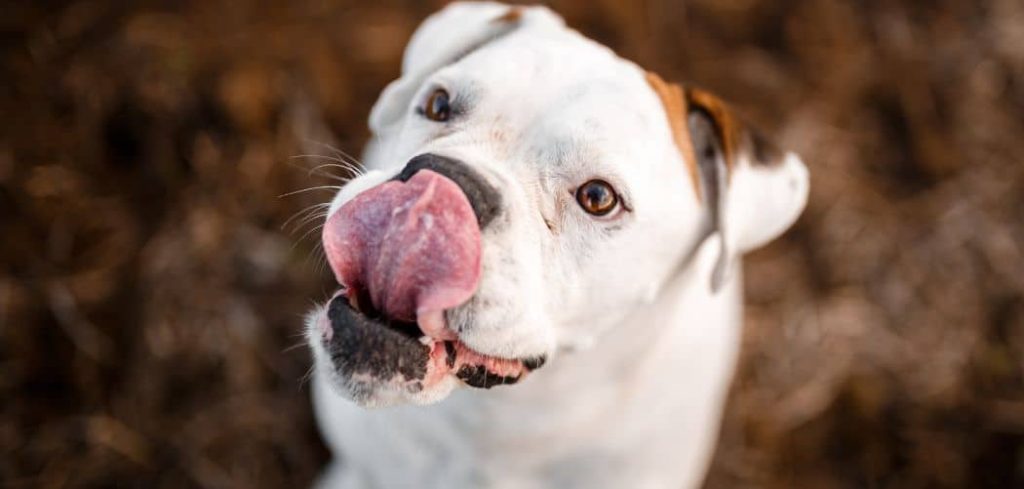Seeing your dog vomit bile and then immediately drink large amounts of water can be worrying.
While some dogs recover quickly, others may be showing signs of an underlying problem that needs attention.
We outline the common causes of a dog throwing up bile and drinking a lot of water, what you can do at home, and when to seek veterinary help.
Dog Throwing Up Bile and Drinking A Lot of Water — Why It Happens
A dog may vomit bile and then drink lots of water because the vomiting leaves their stomach empty and dehydrated, prompting thirst. Common causes include acid reflux, gastritis, dietary indiscretion, or underlying issues like pancreatitis and kidney disease.
While the urge to drink water is natural after vomiting, excessive intake can sometimes worsen the cycle and trigger more vomiting.

Dog Throwing Up Bile and Drinking A Lot of Water: Common Causes
Empty Stomach (Bilious Vomiting Syndrome)
When dogs go too long without food, bile and stomach acids irritate the stomach lining.
This often leads to vomiting a yellow or greenish liquid, especially in the morning.
Afterward, dogs tend to drink lots of water to ease the discomfort and rehydrate. While occasional episodes may not be serious, frequent bilious vomiting can cause irritation and weight loss if not managed.
Read more: Dog Throwing Up Bile but Acting Normal (When to worry)
Gastritis
Gastritis is inflammation of the stomach lining and can be triggered by spoiled food, toxins, or sudden dietary changes.
Dogs with gastritis may vomit bile and instinctively drink water to soothe the burning sensation in their stomach.
Unfortunately, drinking too quickly can cause more vomiting, leading to a cycle that worsens the irritation. Chronic gastritis should always be checked by a vet.
Acid Reflux
Acid reflux occurs when stomach acid flows back into the esophagus. Dogs experiencing reflux may vomit bile and then drink water to relieve the burning sensation.
While occasional reflux can be mild, frequent episodes suggest an ongoing digestive problem. Over time, acid reflux can damage the esophagus and make eating painful.
Pancreatitis
Pancreatitis is inflammation of the pancreas and can range from mild to life-threatening.
One of its early signs is vomiting bile, often paired with excessive thirst. Dogs may drink large amounts of water as their body attempts to flush out toxins, but they may vomit again soon after.
Other symptoms include abdominal pain, lethargy, and loss of appetite. This condition requires prompt veterinary care.
Kidney Disease
Kidney disease often causes increased thirst and urination. In some cases, it may also cause nausea and bile vomiting as toxins build up in the bloodstream.
Dogs with kidney disease often appear thirsty all the time, even after vomiting. Since kidney problems can progress quickly and are serious, immediate veterinary evaluation is important.
Intestinal Parasites
Parasites like roundworms or giardia can irritate the digestive tract, sometimes leading to bile vomiting.
The irritation may make dogs drink more water in an attempt to feel better. While some dogs seem otherwise normal, parasites can cause chronic digestive upset, weight loss, and dehydration if untreated.
What to Do If Your Dog Is Throwing Up Bile and Drinking A Lot of Water
If your dog vomits bile once and then drinks water, monitor them closely. Sometimes, offering smaller, more frequent meals throughout the day helps reduce bile buildup in an empty stomach. A bedtime snack may also prevent morning vomiting.
You can temporarily switch your dog to a bland diet, such as boiled chicken and rice, to give the stomach a rest.
If your dog drinks water excessively after vomiting, try limiting access to small amounts at a time to prevent repeat vomiting. Always provide fresh, clean water, but encourage slow, steady drinking rather than gulping.
Regular parasite prevention and avoiding sudden food changes also help reduce episodes. However, if vomiting and excessive drinking occur repeatedly, a vet visit is necessary to rule out conditions like pancreatitis, kidney disease, or gastritis.
When to Call or Visit Your Vet
While a one-time episode may not be alarming, repeated bile vomiting paired with excessive drinking can signal a more serious condition.
Call your vet if your dog vomits multiple times a day, cannot keep water down, or shows additional signs such as lethargy, diarrhea, weight loss, or refusal to eat. Dogs with abdominal pain, dehydration, or blood in their vomit should be seen immediately.
Puppies, senior dogs, or dogs with pre-existing health issues are more vulnerable and should be evaluated promptly after vomiting bile and drinking excessively. Early veterinary care can prevent complications and ensure proper treatment.
Read more: Dog Throwing Up Bile and White Foam (When to worry)
Key Takeaway
A dog throwing up bile and drinking lots of water may be experiencing anything from an empty stomach to more serious issues like gastritis, pancreatitis, or kidney disease.
While some cases are mild and manageable at home, frequent episodes or additional symptoms should never be ignored.
Offering small meals, managing water intake, and seeking veterinary help when necessary are the best ways to keep your dog safe and comfortable.
